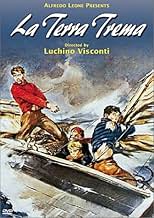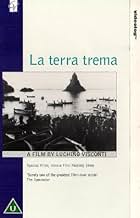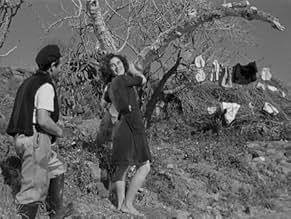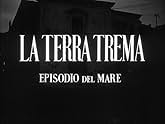VALUTAZIONE IMDb
7,8/10
5928
LA TUA VALUTAZIONE
Nella Sicilia rurale, i pescatori vivono in balia degli avidi grossisti. Una famiglia rischia tutto per acquistare la propria barca e operare in autonomia.Nella Sicilia rurale, i pescatori vivono in balia degli avidi grossisti. Una famiglia rischia tutto per acquistare la propria barca e operare in autonomia.Nella Sicilia rurale, i pescatori vivono in balia degli avidi grossisti. Una famiglia rischia tutto per acquistare la propria barca e operare in autonomia.
- Regia
- Sceneggiatura
- Star
- Premi
- 1 vittoria e 1 candidatura in totale
Luchino Visconti
- Narrator
- (voce)
- (non citato nei titoli originali)
Antonio Pietrangeli
- Narrator
- (voce)
- (non citato nei titoli originali)
Antonio Arcidiacono
- Ntoni
- (non citato nei titoli originali)
Giuseppe Arcidiacono
- Cola
- (non citato nei titoli originali)
Venera Bonaccorso
- La vecchia che ride
- (non citato nei titoli originali)
Nicola Castorino
- Nicola
- (non citato nei titoli originali)
Rosa Catalano
- Rosa
- (non citato nei titoli originali)
Rosa Costanzo
- Nedda
- (non citato nei titoli originali)
Alfio Fichera
- Michele
- (non citato nei titoli originali)
Carmela Fichera
- La baronessa
- (non citato nei titoli originali)
Rosario Galvagno
- Don Salvatore, il maresciallo dei carabinieri
- (non citato nei titoli originali)
Agnese Giammona
- Lucia
- (non citato nei titoli originali)
Nelluccia Giammona
- Mara
- (non citato nei titoli originali)
Ignazio Maccarone
- Maccarone
- (non citato nei titoli originali)
Giovanni Maiorana
- Un bambino
- (non citato nei titoli originali)
Antonino Micale
- Vanni
- (non citato nei titoli originali)
Maria Micale
- La madre
- (non citato nei titoli originali)
Recensioni in evidenza
The first time I had encountered the director Luchino Visconti was when I was more and more into the Italian Neorealism, the movement that can probably be considered one of the most genuine waves in European cinema. Having seen Visconti's most popular movies, including IL GATTOPARDO, L'OSSESSIONE, LA CADUTA DEGLI DEI or MORTE A VENEZIA as well as his earlier productions, I started to understand his conception of art in movie and it gradually appealed to me more. However, I realized that Visconti was the aristocrat who became a member of the Communist party representing the left wing of Italian artists. Even this film made way for the Italian socialists, which, for me, is not a very privileged information. But that is not the gist of my analysis. The most important aspect for me is the artistic side of the whole work, something in terms of which we evaluate LA TERRA TREMA nowadays.
LA TERRA TREMA, though not a top notch Neorealist work, is a film that resembles almost all the principles of Neorealism retained by the great directors: Rossellini, DeSica, Pasolini. At the same time, all of these aspects are still much appreciated and searched by many today's authors.
First, the cast consist of all non-professionals: simple fishermen of Sicily where, naturally, everyone has the role he/she knows how to perform in real life. And how they do in the movie: perfectly, the whole story is very authentic thanks to them. Sometimes, the performances are so well managed that you, as an experienced 21st century viewer, do not feel it's all acting. Moreover, they feel comfortable in the locations they know: so magical places of the Sicilian coast.
Second, the movie refers to the very realistic situations that were obvious in the Italy of that time. It was 1948 and the country was suffering the horrific consequences of WWII and the regime of "Il Duce" Mussolini. The tragic story of the Valastro family is something many people could empathize with at the time and, moreover, can still empathize nowadays. Ntonio, though formerly respected member of the community (Sicilian village of Acci Trezza) starts to lose everything. There comes a day when he has no job, is taken advantage of any time being no more respected. His brother Cola is on the verge of despair leaving the family to find a better future. Two sisters experience hardship as young women. The grandpa gets ill. The whole family is on the verge of total tragedy when they are forced to leave the house, their only property. The monotonous life gets even worse, turns into the life of poverty, helplessness and suffering. Is there a way to live a normal life in such circumstances?
Third, the whole movie is a profound development of characters within these very personal stories. Ntonio is an idealist who tells his brother that his love to his hometown has kept him there and will keep him till his death ("We were born here and we will die here"). At the same time, he is easily brought to despair (starts to spend the nights drinking in taverns). Cola is a youngster who respects his family but desires a better life. I'll never forget the scene he says "Farewell" to the picture of his family when sorrow is combined with fear and helplessness with desire. Mara is a very religious young woman who accepts sorrows and hardship claiming this all is the Will of God. The other sister, Lucia, is a normal girl, like every other; yet the tragic situation leads her to the cold acceptance of "male use." The little shining necklace seems to steal her heart.
Similarly to the top Neorealist movies, like GERMANIA ANNO ZERO or ROMA CITTA APERTA, LA TERRA TREMA focuses on individuals in the society, in the community at hard times. On the one hand, there are so many praying women at Valastro's house when the grandfather is being taken to Catania, to hospital; on the other hand, the Valastro family hear very bitter words "God has punished you for your pride!" from the same people. It is not the ostentation but solidarity of people that leads to better future, better life; it is the lack of solidarity that leads to hell on earth. That is beautifully executed in Ntonio's conversation with a simple girl on the shore at his past boat: "I'd gladly help you"... Politically and historically speaking, that was the point which gave way to socialist ideas.
But so far, I have not touched the most significant aspect why the film is so much worth seeing. Although it is pretty long, it is black and white, it has the narrator that may distract some of the modern viewers, LA TERRA TREMA is "like a loaf of bread to the poor", a wonderful gift for today's viewers who may see what a film may be like, how many messages it can convey, not from the political perspective only but from a simple empathy with humanity, which was most precious thing about Neorealism calling for change. Although these times are gone forever and some islands of poverty turned into isles of prosperity, this change is still so desirable...
See this! You'll not regret and don't be discouraged by its length and documentary like style. It's worth your search! By the way, one of the assistant directors of the movie was Maestro Franco Zeffirelli
LA TERRA TREMA, though not a top notch Neorealist work, is a film that resembles almost all the principles of Neorealism retained by the great directors: Rossellini, DeSica, Pasolini. At the same time, all of these aspects are still much appreciated and searched by many today's authors.
First, the cast consist of all non-professionals: simple fishermen of Sicily where, naturally, everyone has the role he/she knows how to perform in real life. And how they do in the movie: perfectly, the whole story is very authentic thanks to them. Sometimes, the performances are so well managed that you, as an experienced 21st century viewer, do not feel it's all acting. Moreover, they feel comfortable in the locations they know: so magical places of the Sicilian coast.
Second, the movie refers to the very realistic situations that were obvious in the Italy of that time. It was 1948 and the country was suffering the horrific consequences of WWII and the regime of "Il Duce" Mussolini. The tragic story of the Valastro family is something many people could empathize with at the time and, moreover, can still empathize nowadays. Ntonio, though formerly respected member of the community (Sicilian village of Acci Trezza) starts to lose everything. There comes a day when he has no job, is taken advantage of any time being no more respected. His brother Cola is on the verge of despair leaving the family to find a better future. Two sisters experience hardship as young women. The grandpa gets ill. The whole family is on the verge of total tragedy when they are forced to leave the house, their only property. The monotonous life gets even worse, turns into the life of poverty, helplessness and suffering. Is there a way to live a normal life in such circumstances?
Third, the whole movie is a profound development of characters within these very personal stories. Ntonio is an idealist who tells his brother that his love to his hometown has kept him there and will keep him till his death ("We were born here and we will die here"). At the same time, he is easily brought to despair (starts to spend the nights drinking in taverns). Cola is a youngster who respects his family but desires a better life. I'll never forget the scene he says "Farewell" to the picture of his family when sorrow is combined with fear and helplessness with desire. Mara is a very religious young woman who accepts sorrows and hardship claiming this all is the Will of God. The other sister, Lucia, is a normal girl, like every other; yet the tragic situation leads her to the cold acceptance of "male use." The little shining necklace seems to steal her heart.
Similarly to the top Neorealist movies, like GERMANIA ANNO ZERO or ROMA CITTA APERTA, LA TERRA TREMA focuses on individuals in the society, in the community at hard times. On the one hand, there are so many praying women at Valastro's house when the grandfather is being taken to Catania, to hospital; on the other hand, the Valastro family hear very bitter words "God has punished you for your pride!" from the same people. It is not the ostentation but solidarity of people that leads to better future, better life; it is the lack of solidarity that leads to hell on earth. That is beautifully executed in Ntonio's conversation with a simple girl on the shore at his past boat: "I'd gladly help you"... Politically and historically speaking, that was the point which gave way to socialist ideas.
But so far, I have not touched the most significant aspect why the film is so much worth seeing. Although it is pretty long, it is black and white, it has the narrator that may distract some of the modern viewers, LA TERRA TREMA is "like a loaf of bread to the poor", a wonderful gift for today's viewers who may see what a film may be like, how many messages it can convey, not from the political perspective only but from a simple empathy with humanity, which was most precious thing about Neorealism calling for change. Although these times are gone forever and some islands of poverty turned into isles of prosperity, this change is still so desirable...
See this! You'll not regret and don't be discouraged by its length and documentary like style. It's worth your search! By the way, one of the assistant directors of the movie was Maestro Franco Zeffirelli
1. This movie is likely to excruciate those who are not used to reading fast, because the images are too great to be sacrificed for subtitles. Even most of the Italian-speaking people have a hard time understanding this Sicilian accent.
2. The other reason why La terra trema is found boring by many is that reality matters much more than drama to the neorealist director Luchino Visconti. So the audience shouldn't be passive while seeing some real lives going on, that is the only way to feel engaged.
3. The most notable advantage of the movie comes to attention right here. It is touching without bending over backwards for that purpose. You can feel connected to it and at the same time wonder where all that connection comes from. (The movie does not try hard to make you feel this way) It shakes your deepest emotions simply because all it has to do with is the reality of a human society, and also with the real nature for that matter.
4.Another important point here is Visconti doesn't let the fact that he believes in Socialism affect the reality of what he is portraying. The hammer and sickle on the wall in no way seems anything other than part of a neutral report. He reminds us of those journalists who succeed in providing us with an unbiased report regarding a massively resented dictator when we are pretty sure the journalist hates the dictator as much as we do.
5. All in all this is a great picture , of course it requires active audience who know what they want to get from the almost sheer reality pictured.
2. The other reason why La terra trema is found boring by many is that reality matters much more than drama to the neorealist director Luchino Visconti. So the audience shouldn't be passive while seeing some real lives going on, that is the only way to feel engaged.
3. The most notable advantage of the movie comes to attention right here. It is touching without bending over backwards for that purpose. You can feel connected to it and at the same time wonder where all that connection comes from. (The movie does not try hard to make you feel this way) It shakes your deepest emotions simply because all it has to do with is the reality of a human society, and also with the real nature for that matter.
4.Another important point here is Visconti doesn't let the fact that he believes in Socialism affect the reality of what he is portraying. The hammer and sickle on the wall in no way seems anything other than part of a neutral report. He reminds us of those journalists who succeed in providing us with an unbiased report regarding a massively resented dictator when we are pretty sure the journalist hates the dictator as much as we do.
5. All in all this is a great picture , of course it requires active audience who know what they want to get from the almost sheer reality pictured.
It's hard to believe that I am the first person to comment on this masterpiece at this website. One reason could be that it's not that easy to see. Thank God for Turner Classic Movies, which is where I finally saw it. I'm happy to see that there's a DVD available.
This is one of those amazing films that uses only non-professionals and in which they perform as well, if not better, than any professional could. The actors are the inhabitants of a small Sicilian fishing village. The film is cliche-ridden (the Marxist variety) and at times predictable. I didn't care about any of this. The film is a true epic about a few people trying to break out of their rut of exploitation and the wretchedness of their everyday living, and failing. The film thus achieves the status of true tragedy. This one shouldn't be missed.
This is one of those amazing films that uses only non-professionals and in which they perform as well, if not better, than any professional could. The actors are the inhabitants of a small Sicilian fishing village. The film is cliche-ridden (the Marxist variety) and at times predictable. I didn't care about any of this. The film is a true epic about a few people trying to break out of their rut of exploitation and the wretchedness of their everyday living, and failing. The film thus achieves the status of true tragedy. This one shouldn't be missed.
A Marxist aristocrat, Count Don Luchino Visconti Di Morone was widely praised for both the realism and vaguely politicized tone of his early films, and the operatic sumptuousness of his later historical costume dramas... Throughout his career, however, style dominated content; all too often, the result was camp, decorative melodrama disguised as solemn, socially significant art...
"La Terra Trema," an epic account of the hardship suffered by Sicilian fishermen, was even closer to Neo-realism, shot on location with a cast of nonprofessional actors living their lives on screen... Its somewhat simplistic Marxist message, that the peasants' real enemy was not Nature but exploitive businessmen, was in fact less indicative of Visconti's future and its use of a disintegrating family to mirror the social climate of Italy as a whole...
The conflicts, misery, poverty, joy, and anger in a fishing village are shown in a panoramic study of man and earth...
'The Earth will Tremble' is not political nor intends to teach... The film reveals... it doesn't judge...
The cinematography is outstanding, particularly the scenes with the fishermen at sea...
"La Terra Trema," an epic account of the hardship suffered by Sicilian fishermen, was even closer to Neo-realism, shot on location with a cast of nonprofessional actors living their lives on screen... Its somewhat simplistic Marxist message, that the peasants' real enemy was not Nature but exploitive businessmen, was in fact less indicative of Visconti's future and its use of a disintegrating family to mirror the social climate of Italy as a whole...
The conflicts, misery, poverty, joy, and anger in a fishing village are shown in a panoramic study of man and earth...
'The Earth will Tremble' is not political nor intends to teach... The film reveals... it doesn't judge...
The cinematography is outstanding, particularly the scenes with the fishermen at sea...
In 1947, in Sicily near Catania, the fishermen in Aci Trezza have been exploited by generations by the local middlemen. The young 'Ntoni Valastro rebels against the economical situation of his poor family and convinces the Valastro to mortgage their simple house in the Fidania Bank in Catania to buy a fish boat of their own and never work again for the wholesalers. In a stormy day, he decides to fish due to the necessity of repaying the debt to the bank; however, the storm destroys his boat and the dream of his family. Without any support and job, 'Ntoni sees the disintegration of his outcast family.
"La Terra Trema: Episodio del Mare" is a heartbreaking, bitter and cruel story of a family of fishermen that decides to change their poor economical situation facing the powerful exploiters. The Marxist "Red Count" Luchino Visconti directs and narrates this little masterpiece of the Italian Neo-Realism casting non-professional actors and actresses, actually fishermen and inhabitants of Aci Trezza. The abusive treatment of the greedy and idle wholesalers gives an idea of how workers were exploited in this period of history and the reason for the ideological fight of classes between Communism and Capitalism. In Brazil, this film was released on DVD by Versátil Distributor. My vote is nine.
Title (Brazil): "A Terra Treme" ("The Earth Shakes")
"La Terra Trema: Episodio del Mare" is a heartbreaking, bitter and cruel story of a family of fishermen that decides to change their poor economical situation facing the powerful exploiters. The Marxist "Red Count" Luchino Visconti directs and narrates this little masterpiece of the Italian Neo-Realism casting non-professional actors and actresses, actually fishermen and inhabitants of Aci Trezza. The abusive treatment of the greedy and idle wholesalers gives an idea of how workers were exploited in this period of history and the reason for the ideological fight of classes between Communism and Capitalism. In Brazil, this film was released on DVD by Versátil Distributor. My vote is nine.
Title (Brazil): "A Terra Treme" ("The Earth Shakes")
Lo sapevi?
- QuizThe cast was exclusively composed of non-professional actors. They were genuine fishermen and inhabitants of Aci Trezza (Sicily). The credits do not name any of the actors, who are collectively listed as "Pescatori Siciliani" (Sicilian Fishermen).
- Citazioni
Title Card: [in Italian] In Sicily, Italian is not the language of the poor.
- Versioni alternativeWas originally released without Italian narration, but it flopped because the Italian audience could not understand the Sicilian dialect. Visconti re-released it with his own narration, which many find detracts from the film.
- ConnessioniEdited into Bellissimo: Immagini del cinema italiano (1985)
I più visti
Accedi per valutare e creare un elenco di titoli salvati per ottenere consigli personalizzati
- How long is La Terra Trema?Powered by Alexa
Dettagli
- Data di uscita
- Paese di origine
- Lingue
- Celebre anche come
- La terra trema: Episodio del mare
- Luoghi delle riprese
- Aziende produttrici
- Vedi altri crediti dell’azienda su IMDbPro
- Tempo di esecuzione2 ore 40 minuti
- Colore
- Proporzioni
- 1.37 : 1
Contribuisci a questa pagina
Suggerisci una modifica o aggiungi i contenuti mancanti

Divario superiore
By what name was La terra trema (1948) officially released in India in English?
Rispondi





















